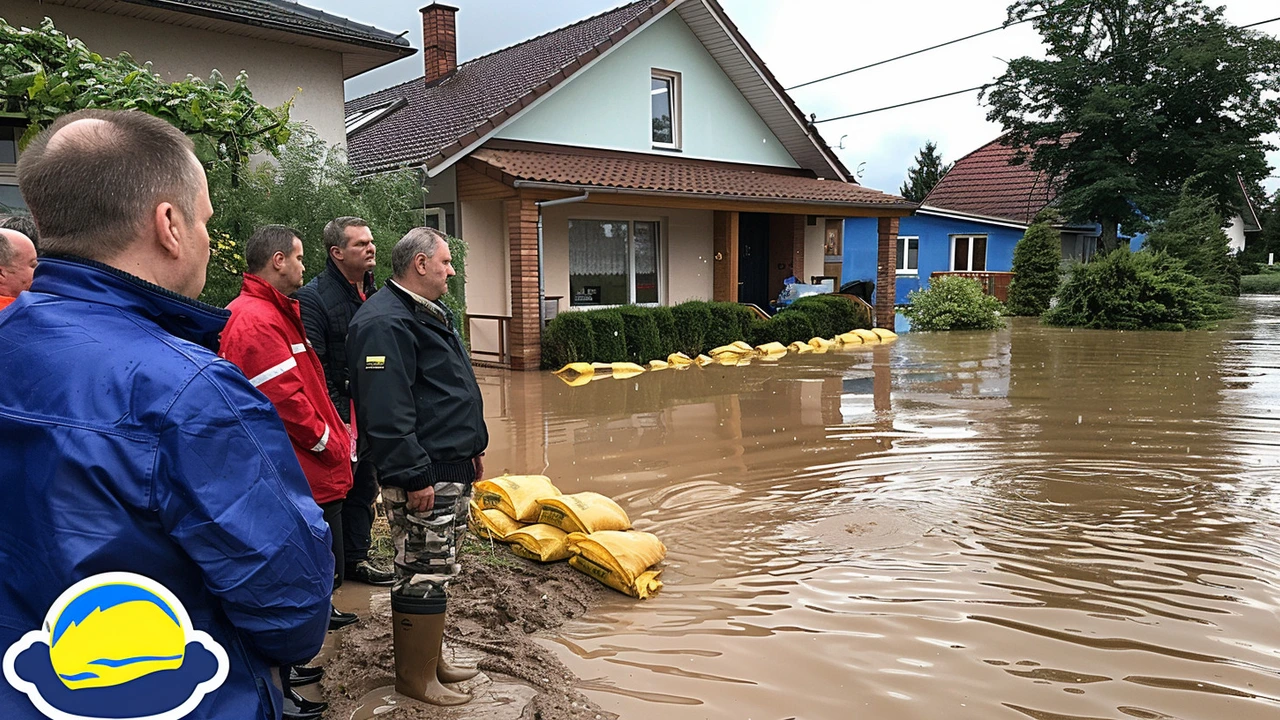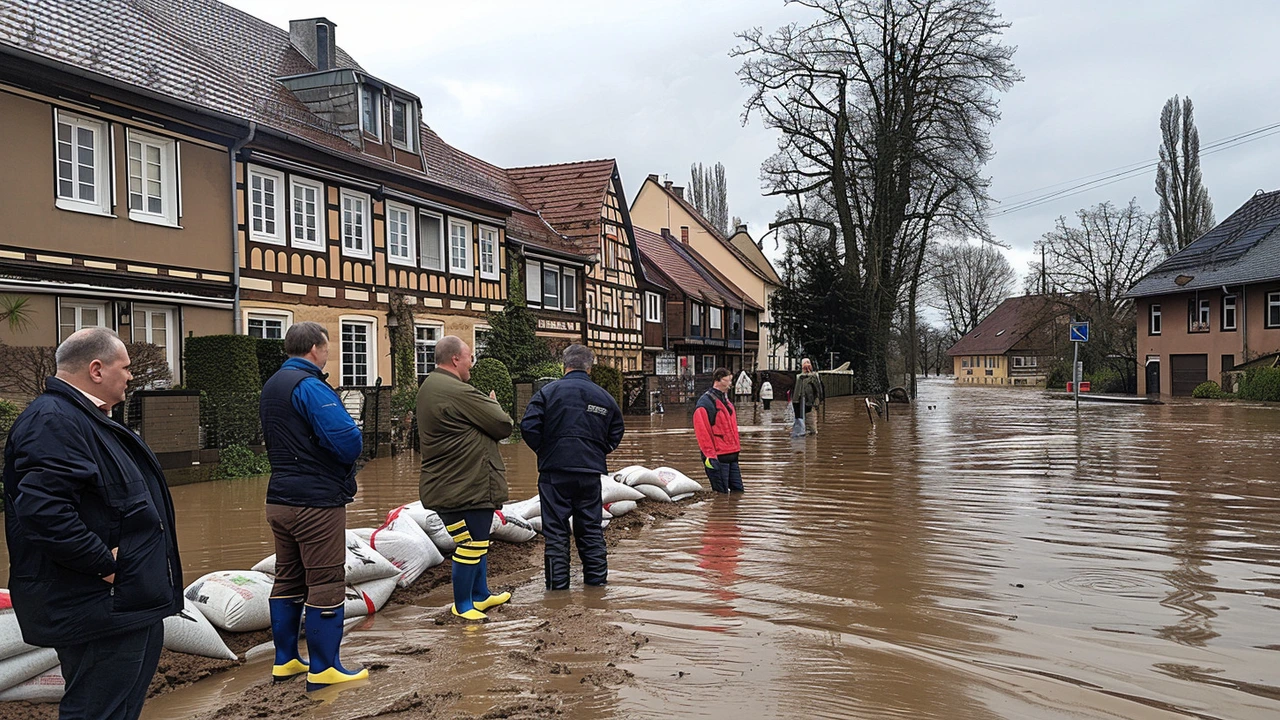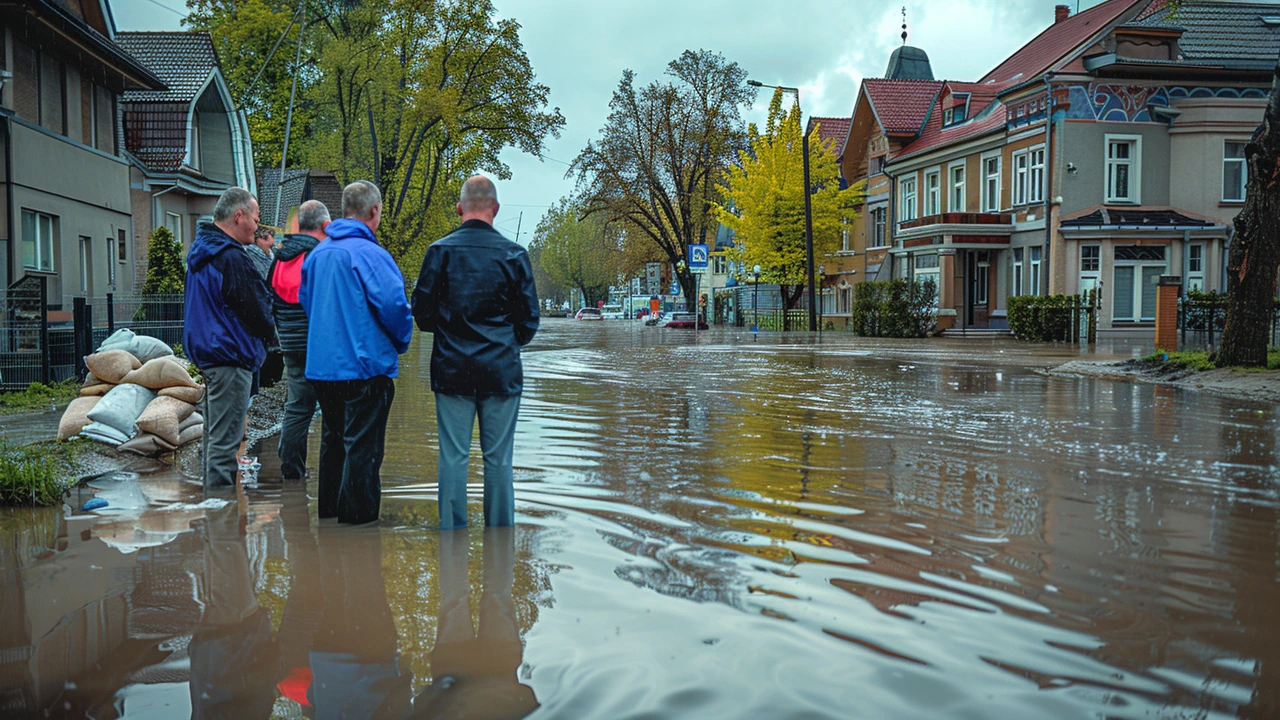
Severe Flooding in Southern Germany Claims Four Lives
The southern regions of Germany are grappling with the aftermath of severe flooding which has claimed the lives of four individuals. The disaster unfolded as relentless heavy rainfall inundated areas in Bavaria and Baden-Wuerttemberg, resulting in widespread chaos and significant disruptions to daily life. The calamity has brought attention to the escalating issue of climate change and its direct impact on weather patterns.
Victims and Rescues Amidst Torrential Downpour
The human toll of the floods has been tragic. In an eerie scene reminiscent of previous disasters, emergency services discovered three bodies in submerged cellars, victims trapped by the rapidly rising waters. Additionally, a firefighter lost his life in a heartbreaking accident involving a rescue boat. The rainwater surged through homes and streets, turning familiar environments into perilous terrains. Authorities have been working round the clock to manage the crisis, but the unpredictable nature of the weather continues to pose severe challenges.
Disruptions and Destruction Across the Region
The downpour did not just claim lives; it also disrupted daily life on an unprecedented scale. Transport systems bore the brunt of the chaos, with long-distance rail routes to Munich temporarily suspended. Roads were rendered impassable, leaving many stranded. The floods had a domino effect, with power outages reported in various localities amid the fleeing populace. Evacuations were underway in the most affected zones as authorities prioritized public safety above all else.

Political Reactions and Climate Change
The floods prompted a swift response at the highest levels of the German government. Chancellor Olaf Scholz visited several affected areas, offering condolences to victims' families and pledging immediate relief efforts. Scholz's visit underscored the urgent need to not only provide immediate aid but also to tackle the root causes of these increasingly common natural disasters. He highlighted the clear link between the frequency of such flooding events and the broader issue of human-induced climate change, emphasizing that tackling global warming is not just a matter of policy but a necessity for survival.
Unpredictable Forecasts and Rising Concern
The situation remains extraordinarily precarious, with meteorologists warning that water levels in some areas may continue to rise. Communities are on high alert, and rescue teams are strategically positioned to assist swiftly should conditions worsen. The recent pattern of torrential rains raises questions about future preparedness and the adequacy of current infrastructure to handle such deluges. As scientists continue to study these patterns, there is wide consensus that climate change significantly contributes to extreme weather, and immediate action is required to mitigate its effects.
Community Efforts and Human Resilience
Amidst the swathes of water and wreckage, stories of human resilience and community solidarity shine through. Neighbors have come together to help one another, from providing temporary shelter to distressed families to assisting in sandbagging efforts to prevent further water ingress. Local businesses and organizations have pooled resources to offer immediate relief to those in need. These acts of kindness and bravery serve as a testament to the unyielding spirit of the human community in the face of natural calamities.

The Imperative of Future Preparedness
The succession of floods in recent times underscores the critical need for future preparedness. Experts stress the importance of robust infrastructure capable of withstanding such extreme weather conditions. Investments in advanced weather forecasting technologies, efficient drainage systems, and community training programs are vital. Educational initiatives to increase public awareness about climate change and its effects could also play a significant role. Practical steps, such as enhancing green spaces to absorb rainwater and constructing resilient buildings, are actions that need urgent consideration.
The Takeaway
The tragic flooding in southern Germany is a potent reminder of the ongoing battle with climate change and the need for immediate, sustained action. The human cost, in terms of lives lost and upheaval caused, is a wake-up call. As the nation mourns, there is also a resolve to rebuild, learn, and fortify against future such events. With a collective effort from governments, communities, and individuals, there is hope that we can mitigate the impact of these natural disasters and protect our shared environment for future generations.
Comments (8)
-
Chinmay Bhoot June 4, 2024
The flood is just the latest excuse to push endless climate taxes on the middle class.
-
Raj Bajoria June 26, 2024
Germany’s river valleys have long been home to vibrant traditions and tight‑knit communities. The recent floods disrupted festivals that have been celebrated for generations. It shows how climate impacts can erode cultural heritage as quickly as it damages infrastructure. Supporting local rebuilding efforts helps preserve those priceless customs.
-
Simardeep Singh July 18, 2024
When the water rushes in, it feels like the world is pulling the rug out from under our feelings. We watch houses become ghostly shells and wonder who’s really to blame – nature, society, or ourselves? The grief that follows is a heavy blanket that drapes over every survivor. It’s not just the loss of bricks; it’s the loss of memories stitched into those walls. In moments like this, the façade of progress crumbles, revealing raw human vulnerability. The headlines scream about climate change, but the real story is the silent scream of families who lost everything. Empathy becomes the only currency we can afford to spend. Let’s not forget that behind every statistic is a beating heart.
-
Aryan Singh August 9, 2024
According to the German Weather Service, the precipitation in the last 48 hours exceeded the 100‑year flood threshold by a factor of 1.3. Such extreme events are statistically linked to rising average temperatures, which increase atmospheric moisture capacity. Enhancing river basin monitoring and expanding retention basins can mitigate future surge impacts. Community‑based early‑warning apps have already reduced response times by roughly 20 % in similar scenarios.
-
Poorna Subramanian August 31, 2024
In light of the recent devastation authorities must prioritize resilient infrastructure investment whilst balancing fiscal responsibility The deployment of modular flood barriers offers a swift and cost‑effective solution Moreover upgrading municipal drainage grids will alleviate urban water accumulation Lastly coordinated cross‑border emergency protocols can enhance resource allocation during such crises
-
Soundarya Kumar September 22, 2024
Totally agree that we need quick fixes like those flood barriers, but let’s also remember the folks who are still picking up the pieces. Small gestures – a warm meal, a spare blanket – can mean the world when the water finally recedes. It’s all about keeping the community spirit alive while the big projects get underway.
-
Sudaman TM October 14, 2024
Another day, another “climate crisis” narrative being fed to the masses 🌧️💸. Governments love to weaponize floods to justify higher taxes and endless regulation. If you ask me, the real problem is reckless urban sprawl, not some abstract CO₂ demon 🙄. Let’s focus on sensible zoning instead of blaming the atmosphere.
-
Rohit Bafna November 2, 2024
The hydrological perturbation observed in southern Bavaria exemplifies a systemic failure of adaptive governance frameworks. Macro‑scale climatological oscillations, amplified by anthropogenic radiative forcing, have transmuted baseline precipitation regimes into stochastic super‑events. Infrastructural resilience metrics, calibrated on historic recurrence intervals, now suffer from epistemic uncertainty that undermines risk assessment methodologies. Consequently, policy makers confront a calibration dilemma: whether to retrofit legacy hydraulic constructs or to subsidize green‑infrastructure retrofits such as permeable pavements and riparian buffers. From a techno‑economic perspective, the cost‑benefit analysis of implementing decentralized retention basins yields a positive net present value when discount rates are adjusted for climate‑induced externalities. Yet, bureaucratic inertia and fragmented jurisdictional authority impede the rapid deployment of these solutions. Inter‑agency coordination protocols must be reengineered to incorporate real‑time data streams from satellite‑based precipitation radar and IoT‑enabled river gauge networks. Furthermore, community resilience training programs should embed scenario‑based simulations that elevate situational awareness among local stakeholders. The sociopolitical dimension cannot be ignored; public trust erodes when relief distribution appears inequitable, thereby catalyzing civic unrest. To mitigate such fallout, transparent governance structures featuring participatory budgeting mechanisms are indispensable. In terms of climate mitigation, decarbonization pathways that prioritize renewable energy integration will attenuate the feedback loop intensifying extreme weather frequencies. Integrating climate‑adaptive design principles into urban planning curricula will cultivate a generation of engineers proficient in resilience thinking. Moreover, the private sector’s role in financing climate‑resilient infrastructure via green bonds must be incentivized through calibrated fiscal policy. Continuous monitoring of catchment area sediment loads will further enhance predictive modeling accuracy. Ultimately, the convergence of scientific foresight, robust governance, and inclusive social contracts determines the trajectory of flood risk management in the Anthropocene.
